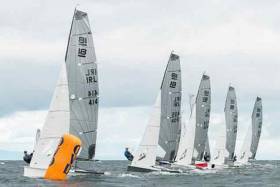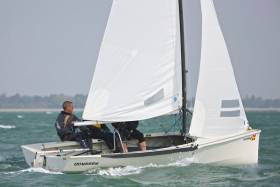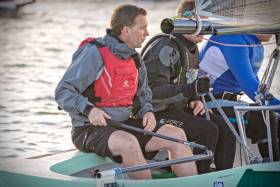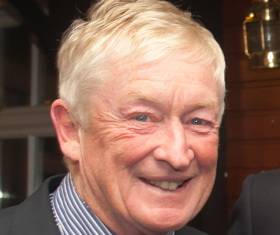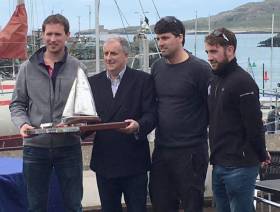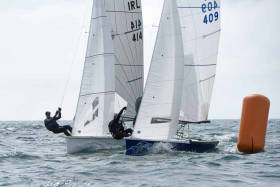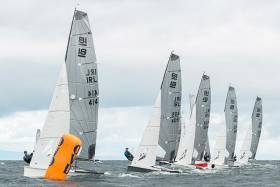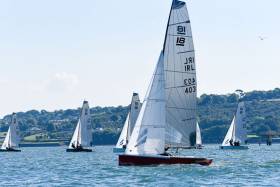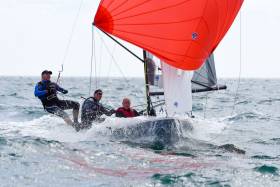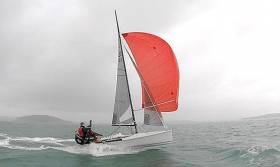Displaying items by tag: National 18
An EGM has been requested by over 10 members of the National 18 dinghy class.
Five proposed rule changes will be proposed at the EGM now scheduled to take place on Saturday, 2nd June at Baltimore Sailing Club as part of the Irish N18 National Championships.
Rule changes include permitting use of smart watches and new rules on immersion testing.
The agenda is attached below.
National 18ft UK Success as Class Heralds 80th Anniversary
The National 18ft Class scored big last weekend finally making the breakthrough everyone knew was possible with a new Morrison designed National 18 winning the Datchet leg of the GJW Direct Sailjuice Winter Series in the UK. This mixed dinghy handicap series is the biggest in the UK regularly attracting entries of more than 100 boats at each of the seven regattas.
The win was all the more impressive as helm Peter Gray with crew Rich Pepperdine and Simon Forbes were sailing a National 18 for the very first time. Their results on Saturday couldn't be matched in a mixed dinghy fleet brimming with talent. With the Sunday pursuit race cancelled due to adverse weather the team from Staunton Harold Sailing Club were declared the winners.
The National 18 ft class celebrates its 80th birthday in 2018 but as members and follows know the class is not acting its age. The Morrison designed "Ultra" division was launched in 2015 following an ambitious modernisation program. The Ultra fleet is growing quickly with five new boats currently on order taking the 2018 UK and IRL fleet size to twenty six boats with a second hand market also beginning to develop. With additional ongoing interest that number is sure to increase in the coming months.
Royal Cork National 18 Season Concludes with Light Air Crews Race
Last Friday evening saw the last races of the National 18 season that consisted of two races in front of Royal Cork Yacht Club and with buoys at the rear of the RCYC marina for an unusual course configuration on the Owenabue river in light winds and officiated by race officer Tommy Dwyer.
The evening also served as the National 18 crews race with some familiar faces in some unfamiliar roles. Tom Crosbie was sailing a borrowed boat as he had sold his beloved 'The Good Wife'. RCYC General Manager Gavin Deane was also helming an entry as was forthcoming Junior All Ireland finalist, Chris Bateman.
Scroll down for photo gallery below by Bob Bateman
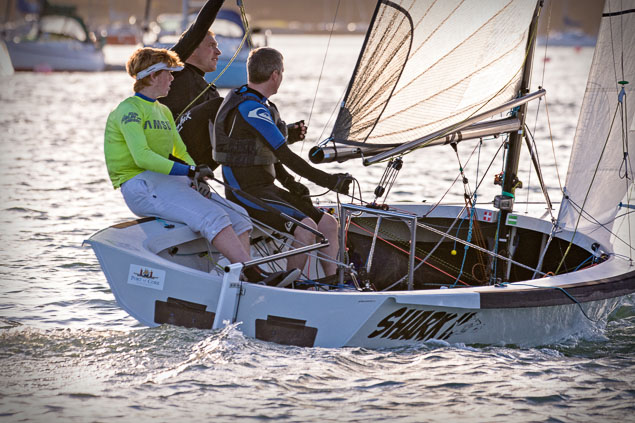
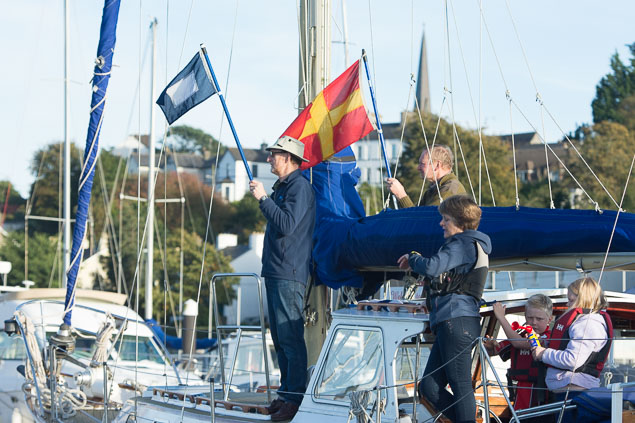
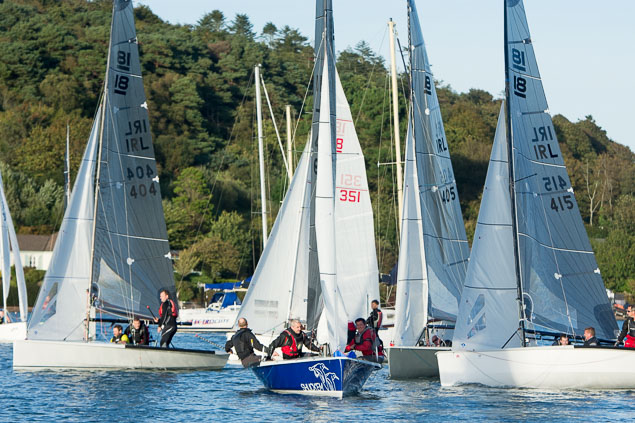
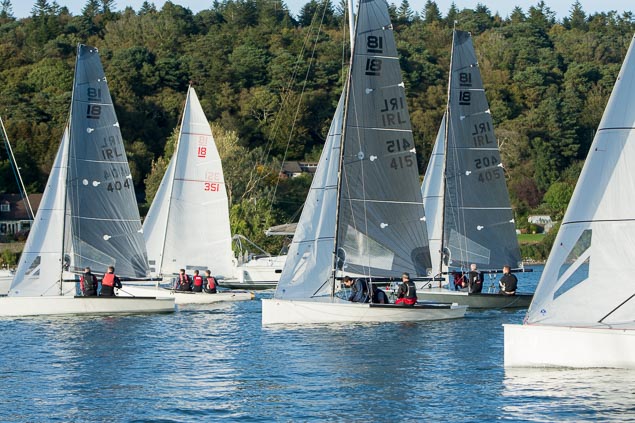
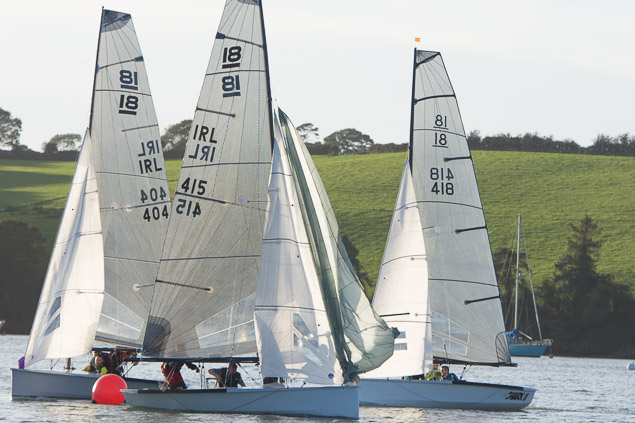
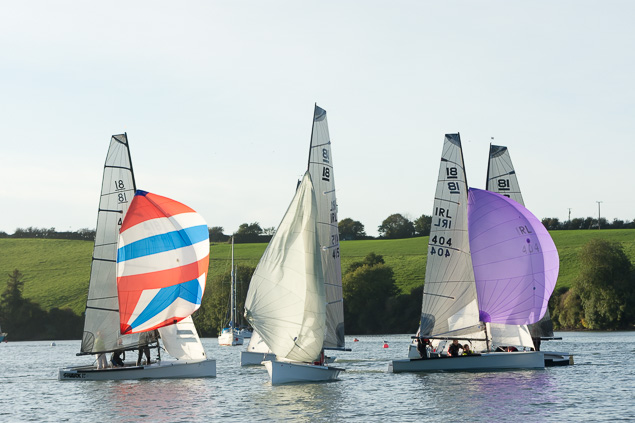
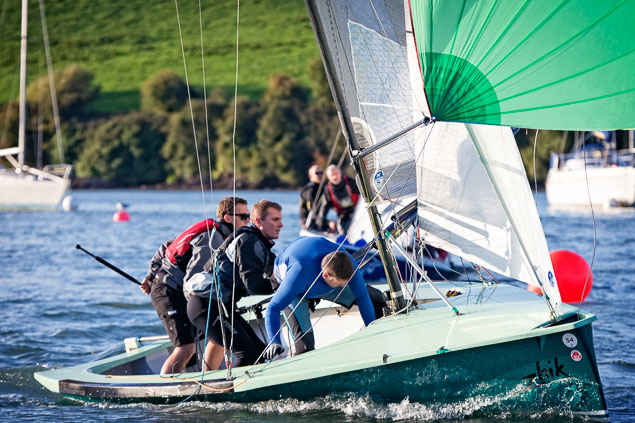
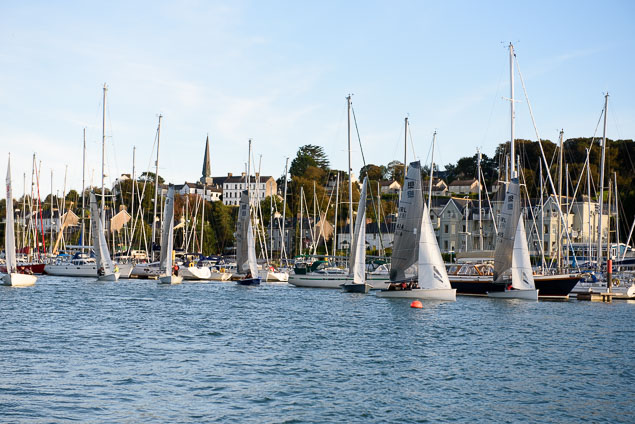
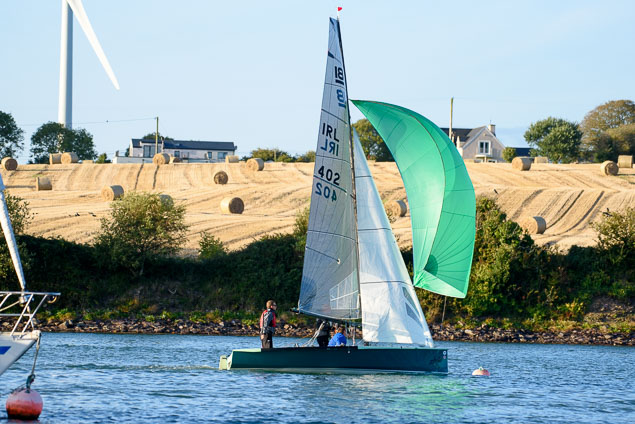
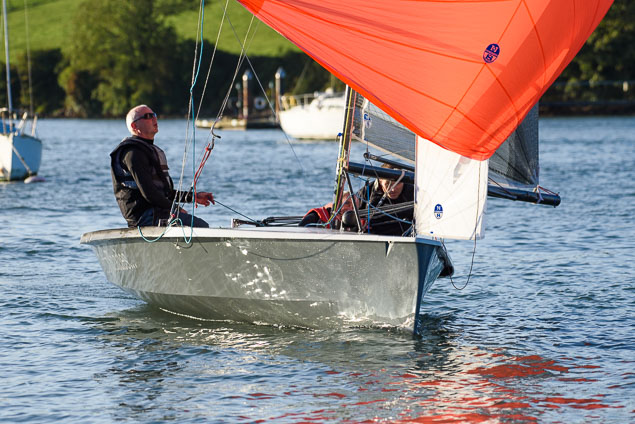
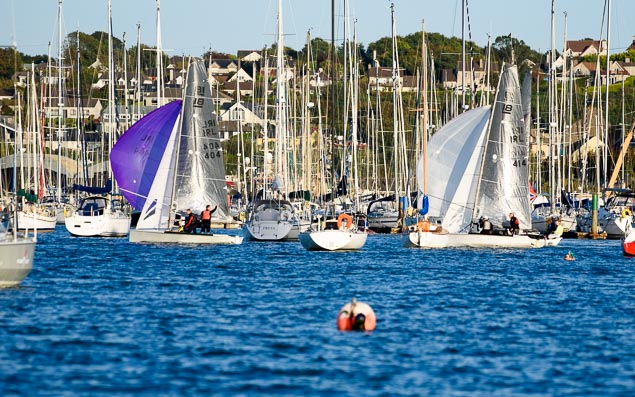
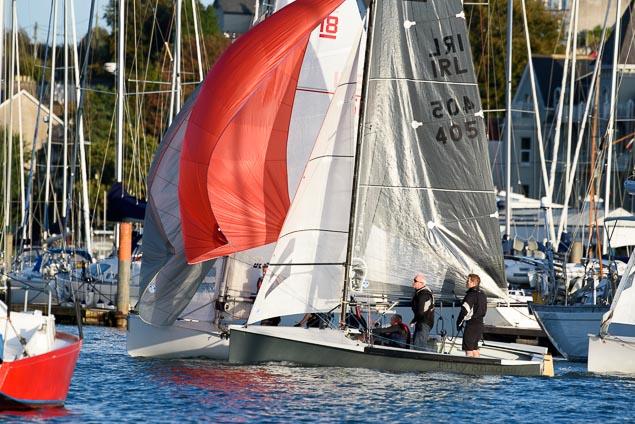
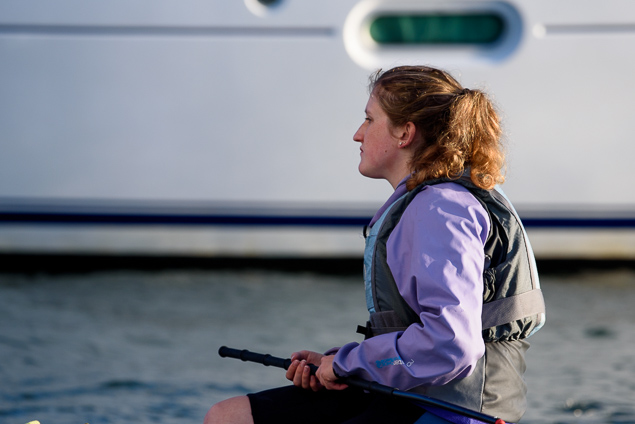
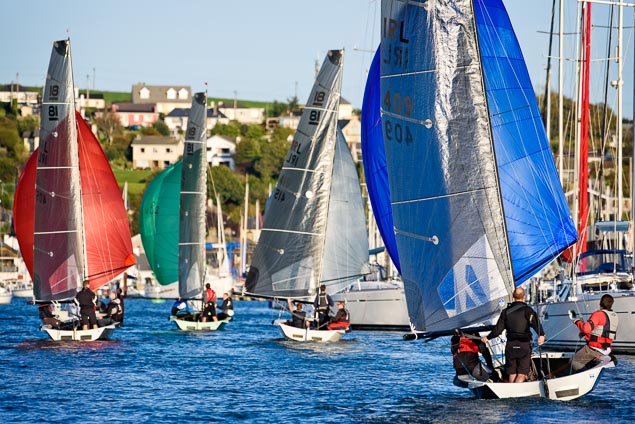
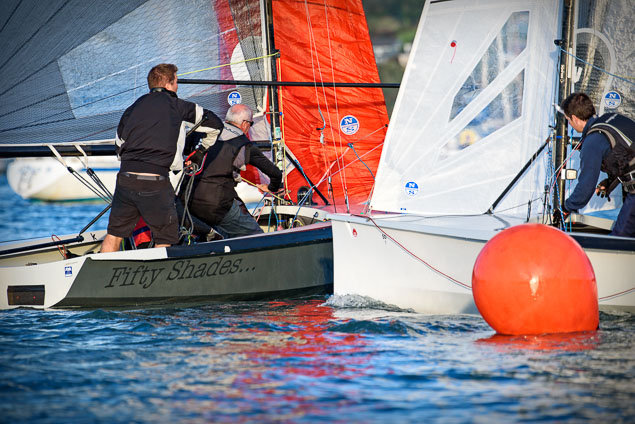
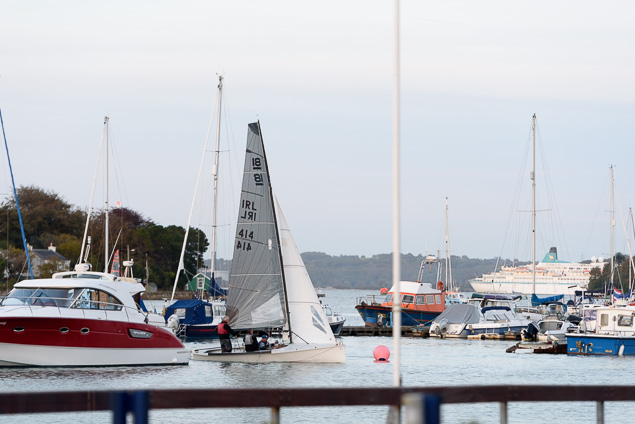
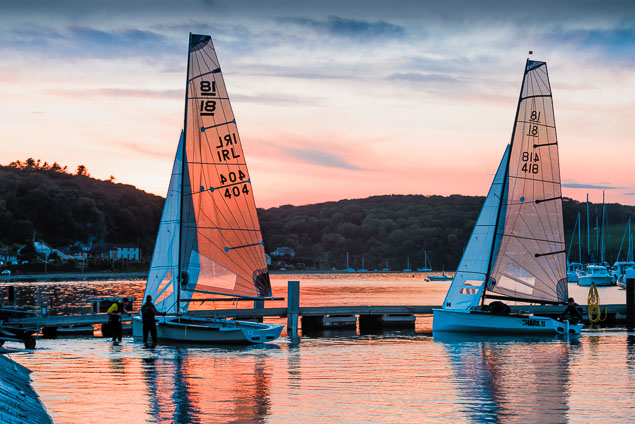
As announced at the recent National 18 Championships, the Cork N18 class are hosting a big party in the Royal Cork Yacht Club on Saturday, 9th September in recognition of Dom Long's 35 years of service to the class.
This will be run in conjunction with the Sutton Book event with guests from Sutton Dinghy Club racing N18's for the day.
There will be plenty of on the water action both sail and power along with a function in the club on Sat evening.
Dwyer Reigns at National 18 Easterns at Howth Yacht Club
Six relatively light wind races completed at Howth Yacht Club gave Charles Dwyer and his crew Nin O'Leary and Richie the overall win of the inaugural six–boat National 18s Eastern Championships in Dwyer's new boat.
A tie break behind them saw Tommy Dwyer, Peter O'Donovan and Charlie Moloney take second with Colin Chapman, Morgan O'Sullivan and Ronan Walsh taking third.
The National 18s continue racing in Cork Harbour with Wednesday leagues already in operation and Saturday racing beginning at the start of May.
No sooner has Howth Yacht Club completed its Spring Warmer Series for keelboats than it is preparing for its first dinghy event of the 2017 Summer season. HYC will host the RS Eastern Championship over the 22nd April and 23rd April.
The RS classes will be joined by Cork Harbour's travelling National 18s and the SB20 sportsboat class.
In the run up to the championships, the RS Feva class are staging a two day training session in Howth. Training is open to all sailors around the country regardless of ability. 20 boats are expected for the Easterns and there is a lot of renewed interest in the class now from Optimist sailors looking to try a two hander.
An early bird entry discount has been extended until tomorrow (April 12), according to HYC's Ross MacDonald. Enter here.
Royal Cork's National 18 Will Be On Display & Racing At Southampton Boat Show 2016
After a successful Irish National Championships this month at Royal Cork Yacht Club, the National 18 Class Association is exhibiting the new Morrison designed National 18 (known as the Ultra) at the Southampton Boat Show from 16 to 25 September 2016.
The National 18 class has undergone a hugely successful period of change and development over the last two years and is now taking a breather and enjoying learning how to get the best out of sailing the fantastic new boats. This means that after two full seasons the boats have been fully tested and developed to meet all the expectations and requirements of the Class members and no more changes are planned in the foreseeable future.
Since the Phil Morrison designed hull was adopted in July 2014, sixteen boats have been built, two more are underway, and a new sail plan has been introduced incorporating a laminate square top mainsail and 21sq m spinnaker, along with twin spinnaker poles. Fifteen Ultras took part in the 2016 National Championship held at Findhorn near Inverness and produced incredibly close and hugely enjoyable racing.
On show at Stand A106 in the Arena will be 'The Shadow' (412) from Blackwater Sailing Club, whilst two National 18s will race in the 'Battle of the Classes' on Sunday 25 September.
The National 18 is available from the Class builder, White Formula of Brightlingsea, at an on-the-water sail away package price of £16,995 including VAT.
The Morrison designed National 18 has, as intended by the Class, created a performance three-person dinghy with one trapeze that is fast and capable of being handled by crews of varying ability, age, and experience; she is not an extreme boat and many people commented that she looks a "proper boat."
The National 18s are renowned for their companionship and great social scene both and on and off the water, as well as for outstanding high performance racing; the Autumn is an ideal time to place an order with the builders to have your new boat ready in good time for next year's racing programme and for the National Eighteen Championships which are to be held at Hayling Island Sailing Club in August 2017.
For further information about the National 18 ClassThe original idea was that of Frank Knowling of Whitstable YC (later to be known as the father of the class) for an 18-foot sailing dinghy, suitable for day sailing, yet fast enough to be of interest to racing sailors and at a reasonable cost. (The first rather hopeful restriction of the original class rules was "Price not to exceed £125 complete with spars, all equipment and designer's fee but not including sails"). The plan was to produce an affordable national alternative to the many local one-designs of about this size to be found right round the coast of the British Isles. Many of these local estuary classes survive today, for example the Mermaid in Dublin, Thames Estuary OD, Chichester Harbour 18 etc.
The well-known designer Uffa Fox won the competition (over the Laurent Giles submitted version) with his 'Ace' design for a clinker-built wooden boat. National 18' number 1, 'Hurricane', was owned by Stanley Beale and sailed at Whitstable, with No.2 'Gust' and No.3 Foam''.
Initial enthusiasm was held back by the effects of World War II but a good deal of 18' building got underway soon afterwards, when mahogany was again available for boat-building and the class became active especially in the Thames Estuary area. By 1950, fleets had appeared at clubs dotted all around the British Isles and Ireland, the Class Association having been formed in 1947.
Although most boats were built to the 'Ace' design, the class had always been 'restricted' rather than 'one-design' and boats with a reduced number of wider planks were built when glued plywood construction was adopted and even one moulded carvel boat was built (252 'Sabon').
Several of the wooden 18's, now called 'Classics' are still in commission, and regularly race, principally at Bosham SC. They include No15 Tinkerbell, built in 1938 and still very competitive.
With the advent of GRP and the rising costs of hard woods, the Class asked Ian Proctor in the late '60's to design a fibreglass hull that would not outclass the existing boats. In this he was successful and it was some time before a Proctor hull won the championships. The first new Proctor, 'Genivieve' was exhibited at the Crystal Palace Dinghy Show of 1970 when a bare hull cost £153. Since then the Class has progressively reduced minimum hull and centreboard weight, and introduced a single trapeze. Also a restriction which requires all new hulls to come from the class mould so they are in effect one-design. Rigs have been optimised and more recently carbon spars introduced.
These changes produced a boat known in the Class as an 'Ultimate' which is fast and exciting to sail and which has provided close and competitive racing for fifteen or so years, both locally and at the annual National Championships. The Royal Cork Yacht Club has the largest fleet.
The class strives to be inclusive in providing heathy competition for all generations of 18s through handicaps and separate starts. Thus though the major trophies at National Championships are awarded in the Ultimate class, there are trophies also for the Pen-ultimates (heavy GRP) and the Classics.
In 2012 the class mould was declared unservicable, and there was much debate about what to do next. This culminated in a request to Phil Morrison to design a hull that was sleeker, lighter, faster and safer, and in so far as reasonably possible within the existing measurement restrictions.
The Morrison prototype was financed by supporters of the Class and built at The Boatyard at Bere in 2013. Named 'Odyssey' and trialled extensively, she ticks all the boxes, is a pleasure to sail and has proved a great success. This development will undoubtedly give the Class a new lease of life, and production of new boats is already under way at White Formula in Brightlingsea.
Irish Sailing Association Seeks Nominees for Junior & All Ireland Sailing Championships
The Irish Sailing Association is inviting class associations to make nominations for the ISA All Ireland Sailing Championship and ISA All Ireland Junior Sailing Championships 2016.
The ISA All Ireland Junior Sailing Championships on September 24th – 25th at Fastnet Marine & Outdoor Education Centre, Schull, Co. Cork. The event will be sailed in FMOEC TR 4.2 class two person dinghies.
The ISA All Ireland Sailing Championship on October 1st – 2nd at Royal Cork Yacht Club, Crosshaven, Co. Cork. The event will be sailed in National 18 three person dinghies.
The ISA is seeking three nominations from each of the senior classes. The junior and youth classes will be advised on the number of places allocated for that class as per notice of race. Nominations will be only accepted from classes whose affiliation fee is paid for 2016.
Class associations are also invited to suggest candidates for a wild card place; these would be members who have excelled at an International competition in the class during the year.
The age limit for the Junior Sailing Championships is under 19 years on December 31, 2016. If a class holds a junior/youth national championship for eligible sailors they may nominate to the Junior championship in the same way and enclosing a copy of the relevant Notice of Race. Please see the Notice of Race for both events below.
The ISA says its policy of a National Race Officer managing racing at a class’s national championship will be strictly applied.
The deadline for nominations is: ISA All Ireland Junior Sailing Championship is 1500hrs on the 12th of September, 2016 and 1500hrs on the 19th of September for the ISA All Ireland Sailing Championships
National 18 dinghy D’Good, D’Bad and D’Blaster sailed by Ewen Barry, Stanley Browne and Dion Barrett was the winner of the nine boat Ultra division of the Irish class championships at Royal Cork YC on six points after five races sailed. Three points behind Second was Aquadisiacs skippered by Colin Chapman with Morgan O’Sullivan and Aaron Walsh with 50 Shades (Nick Walsh, Rob Brownlow and Eddie Rice) third.
Four boats raced in the Ultimate division, with Stephen O'Shaughnessy's Virtual Reality
At an Extraordinary General Meeting held at the Royal Cork Yacht Club on Saturday 27 February, the National 18 Class voted in a number of rule changes that modernise the mainsail for the new Morrison designed 18 and increase the spinnaker size for the class too.
The changes complete a modernisation process that began at the National 18 AGM in Findhorn in 2012, after which Phil Morrison was asked to design a new hull, a prototype was funded by members of the class and then extensively trialed.
The new design was approved in July 2014 and White Formula appointed as builder in the autumn of that year. The first boat was completed in time for the 2015 RYA Suzuki Dinghy Show and eleven new boats were on the water by the time of the 2015 National Championship. As well as enjoying great class racing the new National 18s have been putting in some excellent results at multi-class events, including great results in the GJW Direct SailJuice Winter Series 2015/16.
For the 2016 season at least 17 of the new Morrison boats will be racing and the introduction of the updated mainsail and spinnaker for this season will further enhance an already very successful new design. The new mainsail incorporates a broad head and laminate materials with a full length top batten. The new spinnaker is increased in overall size by 25%, bringing it to 21 sq metres total, and in addition twin spinnaker pole systems will be allowed.
The National 18 will be on show again at the 2016 edition of the RYA Suzuki Dinghy show, which takes place on Saturday 5 and Sunday 6 March. The boat to be displayed on on stand B36 is a brand new build for Julian Berney of Blackwater Sailing Club, which will be formally named at the show at 14.30 on Saturday afternoon.
If you are visiting the show do come along and take a look at this latest addition to the National 18 Class and speak with a member of the fleet about the boats and the opportunities for trial sailing and purchase. A limited number of new boats are still available for delivery for the 2016 Championship which will be held at Findhorn, Scotland, from 1 to 5 August. The price for a new "ready to race" National 18 is £16,995 including VAT and those placing orders at the RYA Suzuki Dingy Show will receive a free trolley with colour matched bunks.


























